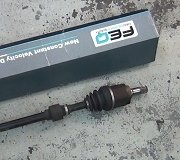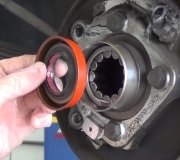Brakes don't have little relevance to CV joints, but motor mounts and driving habits (as well as CV Joint overall quality) play major roles.
Bad motor mounts allow the motor/transaxle assembly to move which could cause stresses to CV axles, especially the inner joint and rubber boot.
Driving habits: If much of your driving is around tight corners, this stresses the rubber accordian boot to the outside joint, causing it to split and lose all its grease. Then, dirt goes in, and it starts making that click-click sound during tight turns.
Overall CV Joint material quality speaks for itself.
CV joints can last almost forever if the rubber boots maintain their integrity and keep dirt out. For example, my vehicle (nevertheless a Toyota, but still has CV joints.) Has well over 200,000 miles with the original CV joints. I've removed and serviced them twice during their service life to replace the rubber boots and re-pack them with grease. They were serviced around 90,000 miles and again around 160,000.
I mentioned brakes have little relevance at the beginning. If your brakes are dragging, this could cause enough heat build-up to affect the rubber boot, but this is an extreme event. Your hub bearings would have failed as well. Only once in my career as a mechanic has a customer approached me with a brake problem so bad that the entire hub was burned out, and was so hot that it started scalding the rubber of the outer CV Joint.
In many vehicles, CV joints are simply a necessary maintenance item. They are not "for-the-life-fo-the-car" parts.
Tuesday, February 17th, 2009 AT 9:16 PM



